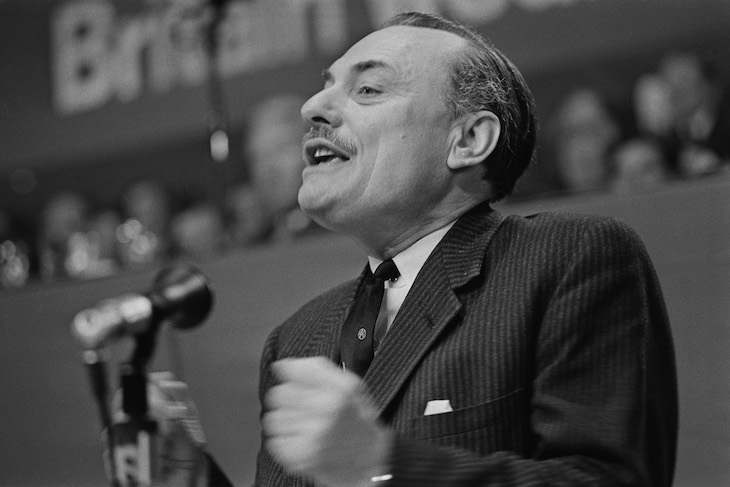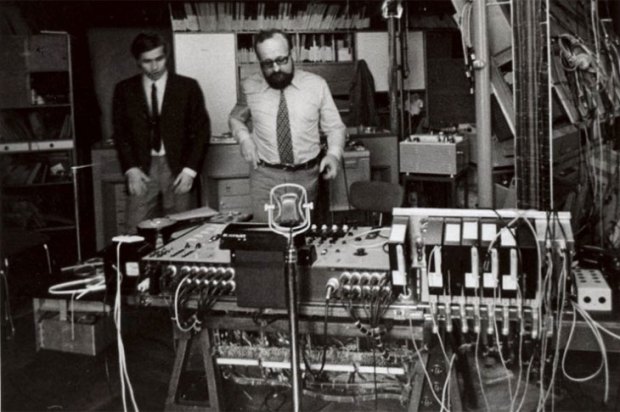It was a provocative decision by the producers of Archive on 4, 50 Years On: Rivers of Blood (Nathan Gower and David Prest) to base their programme around a full exposition of Enoch Powell’s infamous 1968 speech on immigration, all 3,183 words of it, spoken by an actor (Ian McDiarmid) as if he were giving the speech in front of an audience. Why give further publicity to a speech that gave such offence at the time, and so dangerously expressed such inflammatory opinions? But the explosive reaction to the Radio 4 programme on social media, even before it went out on air, explains and justifies their decision.
The speech, given in Birmingham just two weeks after the assassination of Martin Luther King, is constantly referenced, yet very few people ever heard it all the way through or read the full text. Why not get beyond the ‘rivers of blood’ quote we all know (which is in full, ‘I seem to see the River Tiber foaming with much blood’) to hear the whole speech, and in context? Why be so frightened of it now? Why, when we read and listen every day to so many heedless words and senseless tweets, should what Powell said not be analysed and seen in detail for what it is? (Ironically, it was the presenter Amol Rajan’s unguarded tweet in advance of the broadcast that set off the tumultuous reaction in the first place.) The speech, after all, is an event, or rather is representative of a point of view, that is (as Rajan points out) part of postwar British history, whether we like it or not (after the speech there were strikes in support of Powell among steelworkers, dockers and the meat traders of Smithfield).
In any case, Powell’s words were not given to us on Saturday night as one long spiel, as if allowing Powell full sway, without question or interruption. Every few minutes Rajan paused the text to question and debate what had just been uttered, along with a team of commentators, among whom were Powell’s biographer Simon Heffer, and Matthew Parris of this magazine, but also the politician David Lammy, the academic David Dabydeen and Pauline Black of the two-tone band the Selecter. There was enough balance in the interrogation to ensure that what emerged was measured, effective and essential listening.
I never knew, for a start, that before giving the speech Powell was reported as saying, ‘This speech is going to go up “fizz” like a rocket.’ He knew what he was doing, and he wanted to make a storm. Nor did I remember that the speech was made in the midst of the passage through Parliament of the race relations bill. Not content to ramp up the rhetoric with phrases like ‘The black man will have the whip hand over the white man’, Powell also played upon the fears of his Wolverhampton constituents, suggesting that immigrants were clogging up the NHS, using up vital school places and threatening the job prospects of the ‘existing population’. Does any of this sound familiar?
After such a discomfiting listen, it was a relief to hear the calming voice of Radio 3’s Penny Gore on Monday night’s The Essay: Secret Admirers as she divulged her passion for the music of Leos Janacek. ‘I don’t know why it is that a certain composer’s voice can speak to you in a way that others don’t.’ She first heard Janacek’s brassy Sinfonietta on a tinny record player from one of her father’s treasured LPs, and found that something in it resonated with her. ‘Thrilling, and yet somehow troubling. Powerful and yet uncertain. All at the same time.’
She thought it might be something to do with the fact that, like her, Janacek was from ‘somewhere small’ (in his case a village in 1850s Moravia, now part of the Czech Republic). She left to work in London where she ‘felt sure people would find out that I didn’t know what I was doing’. Only later did she realise that ‘confidence is something you can put on like a piece of clothing’. In Janacek’s music she sensed that same blend of assurance and insecurity, ‘It seemed to connect; it seemed honest.’ Even his titles are conflicted, she says: ‘On an Overgrown Path’ or ‘The Diary of One Who Disappeared’. In talking about his music, and its impact on her, and the story of his life, she gave away something of herself.
His most ‘breathtaking’ works (Katya Kabanova, Intimate Letters, The Makropulos Case) were all written in the last few years before he died. Saddened by the death of both his children, the unhappiness of his marriage, and his unrequited love for a much younger woman, he went back to live in the village where he spent his childhood. It’s as if, says Gore, he found his ‘true voice’ again. Janacek himself wrote that ‘the inward environment of childhood is perhaps of most crucial importance for the artist’s work. That’s the root of originality of a piece of art.’ Words used to give meaning to music.
Got something to add? Join the discussion and comment below.
Get 10 issues for just $10
Subscribe to The Spectator Australia today for the next 10 magazine issues, plus full online access, for just $10.
You might disagree with half of it, but you’ll enjoy reading all of it. Try your first month for free, then just $2 a week for the remainder of your first year.














Comments
Don't miss out
Join the conversation with other Spectator Australia readers. Subscribe to leave a comment.
SUBSCRIBEAlready a subscriber? Log in